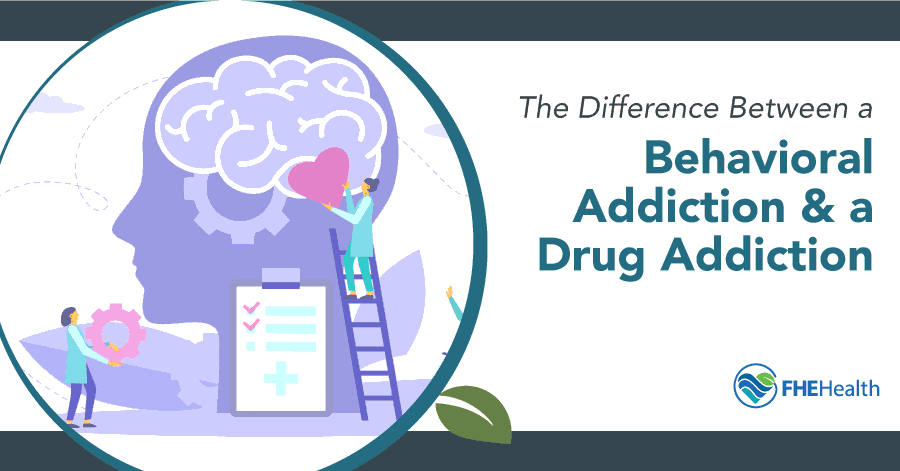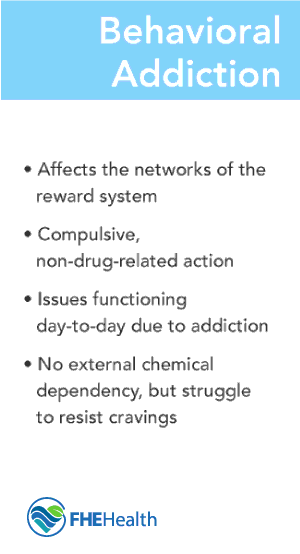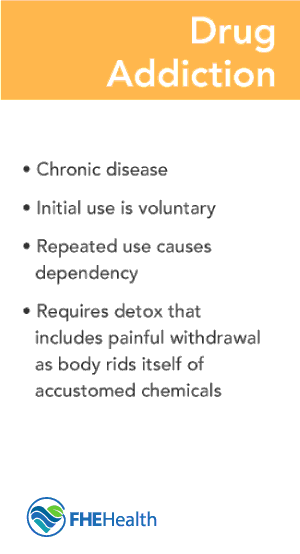
Imagine you’re on a trip with friends to Las Vegas to visit a casino or two. You enter one and hit the tables casually, with a predetermined sum of money you’ve set aside to play with. Once you run out, you’re done, and you and the group leave to get something to eat. This is an example of healthy gambling habits, but in an example we’d use to compare behavioral addiction vs. substance addiction, the story would go much differently.
In this case, you’d find yourself unable to stop because you like the excitement of potentially winning money. You go to the ATM multiple times to get cash for chips so you can keep playing. You almost feel high. Unfortunately, this is all too common.
A person who exhibits a compulsion to risk their money would be called a problem gambler or even a gambling addict. There are support lines and 12-step groups dedicated to this behavior and even behavioral addiction clinics to help people recover.
But there are differences between this and conventional addictions to drugs or alcohol. What does behavioral addiction have in common with substance addiction, and what can we learn from the distinction?
What Is a Behavioral Addiction?
 Behavioral addiction affects the networks of the brain’s risk-reward system. It’s a disorder involving a pattern of repetitive and compulsive actions that aren’t related to the use of a specific substance.
Behavioral addiction affects the networks of the brain’s risk-reward system. It’s a disorder involving a pattern of repetitive and compulsive actions that aren’t related to the use of a specific substance.
In a behavioral addiction, the behavior in question brings euphoric, ecstatic or stress-relieving sensations to the person performing it. In turn, it’s easy to become singularly focused on doing or pursuing this activity despite any roadblocks or adversities that may try to intervene.
As with every addiction, a person will have issues functioning in their normal life that make refraining from the behavior extremely taxing. As with drug addiction, people experience strong cravings and struggle to resist letting the behavior consume their lives.
Examples of Behavioral Addictions
The term behavioral addiction is applied to a wide range of behaviors that fulfill two key requirements. First, they don’t involve introducing a foreign chemical to the body, and second, they’re commonly performed compulsively or without self-control.
Common behaviors to be addicted to include:
- Gambling and playing casino games
- Working out and exercising
- Sex and intimacy
- Dieting and nutritional routines
- Working
Behavioral addictions are part of a group of disorders called process addictions. These are marked by a near-constant compulsion to take part in a habit or routine that provides comfort or pleasurable feelings. These can be any of the above list of behavioral addictions and also share key characteristics with certain mental health disorders like OCD.
Some People Do Have Addictive Personalities
You may have heard a person make a reference to their addictive personality. Some dismiss this as a perception among people who have difficulty controlling their use of substances or their behavior.
According to the Mayo Clinic, however, addictive personalities are real. Certain people — often coming from a family marked by addiction — naturally have more powerful risk-reward systems in their brains, making them more prone to becoming dependent on certain activities to feel happy or functional.
What Is a Chemical Addiction?
 When consumed, certain substances immediately impact the chemistry of the brain and bind to receptors that provide a sense of euphoria or pleasure. Drug users will sacrifice their finances, personal relationships and health to experience the joy it gives them and often become reclusive, as the habit strains their social interactions. Over time, drugs can significantly alter the brain to the point where they impair judgment, learning, decision-making and behavior.
When consumed, certain substances immediately impact the chemistry of the brain and bind to receptors that provide a sense of euphoria or pleasure. Drug users will sacrifice their finances, personal relationships and health to experience the joy it gives them and often become reclusive, as the habit strains their social interactions. Over time, drugs can significantly alter the brain to the point where they impair judgment, learning, decision-making and behavior.
Chemical addiction is a chronic disease that causes an individual to have a persistent desire to use a drug despite potentially dangerous consequences. They experience difficulty managing their urges and are often unable to function daily without the use of a particular substance.
Sustained use leads to needing greater doses to produce the same high compared to when the drug was first tried. If a user attempts to stop, their tolerance level dramatically decreases, and they may overdose if they relapse and take the same amount they used to.
How Does Chemical Dependency Work?
Chemical dependency is created in response to the repeated introduction of external chemicals. Addictive substances bind to receptors in the brain that release chemicals like dopamine and serotonin, known to produce feelings of happiness and euphoria. After a period of repeated use, these receptors become less able to be stimulated without the presence of the drug.
As such, the user is dependent on external chemicals to function normally, and if they go without their drug of choice, they risk facing chemical withdrawal.
What Do Chemical and Behavioral Addiction Have in Common?
So, when assessing a behavioral addiction vs. a substance addiction, what factors do they share? In some ways, behavioral and chemical addictions are actually quite similar, involving:
- The inability to control use of the substance or behavior (dependency)
- A powerful dopamine response to using the substance or performing the behavior
- Cravings and withdrawal symptoms when trying to quit the behavior or substance
This is why there is some crossover between the two areas. A common example is marijuana use. Proponents of legalized marijuana are quick to note that it’s not addictive in the same way as cocaine or heroin, for example. What experts say, however, is that while the THC in marijuana doesn’t cause a chemical dependency, the act of using the substance and the feelings it causes can provoke a sort of behavioral dependency when routinely used.
What Sets Them Apart?
When weighing process addiction vs. substance addiction, it should be acknowledged that a person who needs help is unlikely to suffer from just one or the other. When someone is in the throes of active addiction, a drug addiction is in place, but even if the chemical dependency is completely removed, there’s still addictive behavior left behind that needs to be addressed.
Along similar lines, undergoing treatment for substance addiction can cause a person to develop a new behavioral addiction, or a new habit that satisfies the conditions to be a behavioral and a substance addiction. For example, recovering substance abusers often take up smoking cigarettes. The habitual behavior is comforting to them, and over time, they also become dependent on nicotine.
Substance Addiction Often Causes Physical Damage to the User
One key difference between chemical and behavioral addiction is that the physical signs of drug addiction don’t often accompany behavioral addiction.
Heroin can be injected or smoked. Intravenous use may leave physical marks, cause blood poisoning if dirty needles are used or lead to the transfer of diseases like HIV through the bloodstream. Smoking causes irreparable damage to the lungs that can kill healthy cells and inhibit a user from breathing properly. This type of physical damage is not as prevalent with behaviors like shopping, exercise and gambling.
Substance Addiction Can Have Longer-Term Impacts on Brain Chemistry
Both behavioral and drug addiction cause changes in the brain that produce a high that addicts become obsessed with replicating.
However, drug addiction continued over a period of time may permanently damage the brain and its ability to maintain chemical balance. Some drugs completely destroy neural pathways and break down receptors to the point where some neurotransmitters can no longer be released without the aid of medication or an outside source.
Do They Both Require Treatment?
It’s clear that making a distinction between behavioral addiction vs. substance addiction is important, because substances can cause physical damage, long-term changes to brain function and the risk of consequences like overdose, but in the long run, both types of addiction need treatment.
Even if you’re addicted to something healthy like eating right or exercising, it’s never beneficial when a behavior or a substance has control over your life.
Getting the Help You Need at FHE Health
At FHE Health, we understand the links between substance addictions and process addictions, and we offer specialized treatment paths for a wide range of substances as well as some behaviors. If you or a loved one feels unable to stop using an addictive substance or performing a certain behavior, contact us today and learn about your options for recovery.






